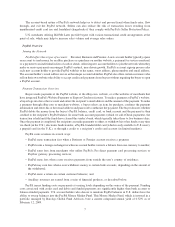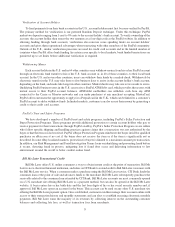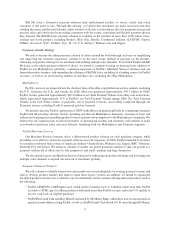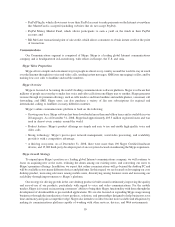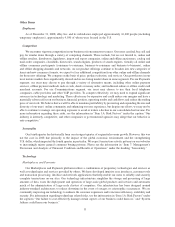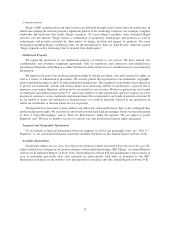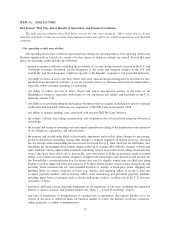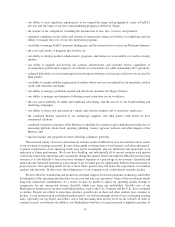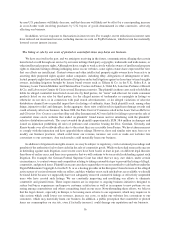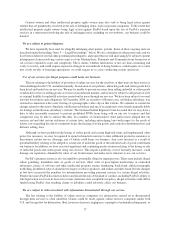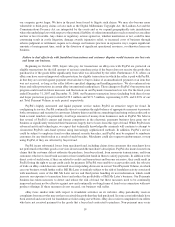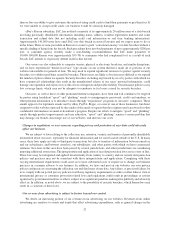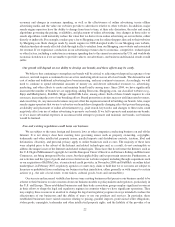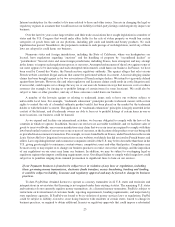eBay 2008 Annual Report Download - page 24
Download and view the complete annual report
Please find page 24 of the 2008 eBay annual report below. You can navigate through the pages in the report by either clicking on the pages listed below, or by using the keyword search tool below to find specific information within the annual report.by non-U.S. purchasers will likely decrease, and that decrease will likely not be offset by a corresponding increase
in cross-border trade involving purchases by U.S. buyers of goods denominated in other currencies, adversely
affecting our business.
In addition, we face exposure to fluctuations in interest rates. For example, recent reductions in interest rates
have reduced our investment income, including income we earn on PayPal balances, which in turn has materially
lowered our net interest income.
The listing or sale by our users of pirated or counterfeit items may harm our business.
We have received in the past, and we anticipate receiving in the future, communications alleging that certain
items listed or sold through our service by our users infringe third-party copyrights, trademarks and trade names, or
other intellectual property rights. Although we have sought to work actively with the owners of intellectual property
rights to eliminate listings offering infringing items on our websites, some rights owners have expressed the view
that our efforts are insufficient. Content owners and other intellectual property rights owners have been active in
asserting their purported rights against online companies, including eBay. Allegations of infringement of intel-
lectual property rights have resulted in threats of litigation and actual litigation against us from time to time by rights
owners, including litigation brought by luxury brand owners such as Tiffany & Co. in the U.S., Rolex S.A. in
Germany, Louis Vuitton Malletier and Christian Dior Couture in France, L’Oréal SA, Lancôme Parfums et Beauté
& Cie, and Laboratoire Garnier & Cie in several European countries. The plaintiffs in these cases seek to hold eBay
liable for alleged counterfeit items listed on our sites by third parties, for “tester” and other not for resale consumer
products listed on our sites by third parties, for the alleged misuse of trademarks or copyrights in listings or
otherwise on our sites, or in connection with paid search advertisements, or for alleged violations of selective
distribution channel laws or parallel import laws for listings of authentic items. Such plaintiffs seek, among other
things, injunctive relief and damages. In the aggregate, these suits could result in significant damage awards and
could adversely affect our business. In June 2008, the Paris Court of Commerce ruled in the Louis Vuitton Malletier
and Christian Dior Couture cases that eBay and eBay International AG were liable for failing to prevent the sale of
counterfeit items on its websites that traded on plaintiffs’ brand names and for interfering with the plaintiffs’
selective distribution network. The court awarded the plaintiffs approximately EUR 38.6 million in damages and
issued an injunction prohibiting all sales of perfumes and cosmetics bearing the Dior, Guerlain, Givenchy and
Kenzo brands over all worldwide eBay sites to the extent they are accessible from France. We have taken measures
to comply with the injunction and have appealed these rulings. However, these and similar suits may force us to
modify our business practices, which could lower our revenue, increase our costs or make our websites less
convenient to our customers. Any such results could materially harm our business.
In addition to litigation from rights owners, we may be subject to regulatory, civil or criminal proceedings and
penalties if the authorities feel we have aided in the sale of counterfeit goods. While we have had some early success
in defending against such litigation, more recent cases have been based, at least in part, on different legal theories
than those of earlier cases, and there is no guarantee that we will continue to be successful in defending against such
litigation. For example, the German Federal Supreme Court has ruled that we may owe duties, under certain
circumstances, to content owners and competitors relating to taking reasonable steps to prevent the listing of illegal,
counterfeit, and pirated items. Plaintiffs in recent cases have argued that we are not entitled to safe harbors under the
Digital Millennium Copyright Act in the U.S. or as a hosting provider in the European Union because of the alleged
active nature of our involvement with our sellers, and that, whether or not such safe harbors are available, we should
be found liable because we supposedly have not adequately removed counterfeit listings or effectively suspended
users who have created such listings. We are constantly improving and modifying our efforts to eliminate
counterfeit and pirated items. These improvements are in response to ongoing business initiatives designed to
reduce bad buyer experiences and improve customer satisfaction as well as in response to new patterns we are
seeing among counterfeiters and others committing fraud on our users. Notwithstanding these efforts, we believe
that the legal climate, especially in Europe, is becoming more adverse to our arguments, which may require us to
take actions which could lower our revenues, increase our costs, or make our websites less convenient to our
customers, which may materially harm our business. In addition, a public perception that counterfeit or pirated
items are commonplace on our site, even if factually incorrect, could damage our reputation and our business.
16



